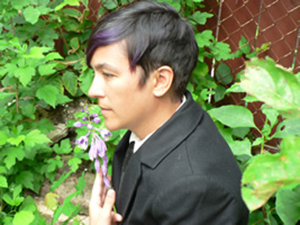
Joyelle McSweeney is an associate professor of English and director of the Creative Writing Program at Notre Dame. She is the author of six books of poetry and prose, as well as a critical book, The Necropastoral: Poetry, Media, Occults, which was published in December 2014.
AL: What makes the Creative Writing Program at Notre Dame distinctive?
McSweeney: We are a team of working artists. We represent a vibrant diversity of backgrounds and aesthetics, and we’re proud of the mentorship we can offer both graduate and undergraduate students. We write novels, stories, nonfiction, poetry, and plays, but our expertise extends into areas of translation, international literature, literature by immigrant and minority writers, social justice, publishing, theory and criticism, and digital forms. That’s quite a lot of ground for seven professors to cover.
AL: How has the program evolved since you’ve been at Notre Dame? What is your vision for the program as director?
McSweeney: Our program’s excellence derives from the vision of founder William O’Rourke, who through determination and perspicacity has been able to build a space for the study of writing at Notre Dame, paired with an internationally renowned journal, the Notre Dame Review.
I’d like to maintain William’s vision while also reintroducing our program to the undergraduates. Many undergrads don’t realize that almost all of our classes are open to non-majors, for example. I’d like to see more undergrads trying their hands at creative writing and thinking about literary careers.
AL: What drew you to Notre Dame?
McSweeney: The chance to work at a big, bustling school with an international outlook.
AL: What do you enjoy most about teaching creative writing (or poetry writing)?
McSweeney: I just love starting with something I love—poetry, which some people find a little scary—and thinking about how to put it in front of students in such a way that they can not only grasp its principles but also catch a little buzz that they carry into their own work.
AL: How do you nurture students’ creativity and help them find their voice as writers?
McSweeney: We read a lot, we write a lot, we analyze movies and performances, we collaborate, and we perform elaborate exercises to bring out each person’s unique diction—I call this hyperdiction. Some hyperdiction exercises include mashups, say, of encyclopedia entries and Elizabeth Barrett Browning sonnets; writing with glossaries; or making a “word bank” of place names, slang terms, technical terms from hobbies or sports, etc., and using that for our poems. Anything to open up students’ ears to their own unique experience of language.
AL: Are there any authors you particularly love sharing with your students?
McSweeney: It’s always amazing to me how the students respond to the ghazal, a North African, Arabic, and South Asian poetry form. Something about this couplet-based, song-like form with its double helix of refrains really wakes up my students’ ears and sense of tone. I’m always down for some ghazals.
AL: Your most recent play, Dead Youth, or, the Leaks, won the inaugural Leslie Scalapino Award for Innovative Women Playwrights in 2013—and you noted that you had been personally influenced by Scalapino. How has Scalapino’s work inspired and affected your writing? What other authors have been especially influential?
McSweeney: Leslie Scalapino is well known as a poet of the Language school, but it’s her narrative work that really has influenced me—her works are so twisting and slippery, with one character often masking another, one genre masking another. I love feeling like Alice tumbling through her bizarrely counterintuitive “novels.”
I have borrowed that in my writing, though my writing is often more straightforward, almost cartoonishly so. I like to have a mix of very recognizable and totally out-there elements in my work, to create that vertigo effect.
I am also a fanboy for Aime Cesaire, Raul Zurita, Jack Smith, Kim Hyesoon, Hiromi Ito, Morrissey, Arthur Rimbaud, Dennis Cooper, Jean Genet, Mac Wellman, Unica Zurn, Suzan-Lori Parks, and classical Greek and Jacobean theatre. I also write about such figures as Julian Assange, Henrietta Lacks, Chelsea Manning, Abuwali Muse, and Edward Snowden—and I draw inspiration from them.
AL: Your creative writing spans a wide range of genres—poetry, plays, and novels. How do you select a format for a new project? What is the writing process like for you?
McSweeney: I feel prompted to write when my mind constructs a juxtaposition of two elements which do and don’t belong together—some kind of sprained connection between two separate images or words or figures or locations or ideas that seem drawn together and repelled at the same time.
I try to grow this shuddering rhyme as in a petri dish or ditch; I try to grow this strange attraction-repulsion and get it to release its strange energies, whether that manifests as verbal profusion or narrative hijinks or outrageous thematic claims. Counterintuitive, like the Sublime.
AL: What advice do you have for students interested in creative writing?
McSweeney: I advise students to take our classes; to read; to be passionate; to write from the geekiest part of themselves—the most passionate and enthusiastic and disarmed and unprotected. A little embarrassment might be a good sign. You are on the right path to poetry nobody but you could have written.


